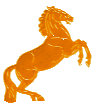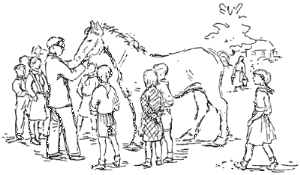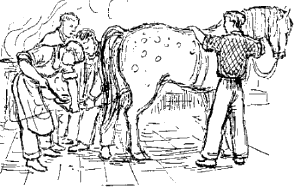 horses and humans
horses and humans
 In all european countries people divides into such, who eat horse meat
and such, who do not so. The reasons are not completely investigated
and go back far into history.
In all european countries people divides into such, who eat horse meat
and such, who do not so. The reasons are not completely investigated
and go back far into history.
Often humans reject horse meat because they have a particulary
tight linkage to horses. Horses are work comrades, play companions
of the children and friends in spare time. To come in touch with them
may become an fascinating experience. So naturally the question remains,
wether it is cultureful to kill such a nature and taking its meat for
food.
The opinions concerning this will probably always go apart, but I think
that it is already worth itself to think about this problem. Therefore
I would like to attach some short thoughts to this internet site:
-
I like horses very much and ride gladly (althought unfortunately
not very well). For me is important, how horses are handled during
lifetime.
-
It has no matter for the horse,
wether its meat is eaten or not,
whereby it supplies, however, an very valuable nutrition which is
too unfortunate as pet food. To be eaten usualy is the normal end
of live for old horses or zebras in free game course.
-
It has important matter for the horse, in which time
and under which circumstances it has been slaughtered. Not the benefit
of horse meat belongs to the heavy loss of culture, but the cruel
livestock transports, how they take place today still crosswise in
Europe. It is better to slaughter horses there, where they lived.

-
Who deals with horses, should always be aware that they are no sport
devices, but living creatures. He should engage hiself for the fact
that horses become old and have been able to enjoy theire lifes for
a long time.
-
Horses and humans belong to each other. I think, we are allowed to
eat their meat, but we have to handle them with respect.
In this manner our internet site should introduce an interesting
product and also invite you to think a little bit deeper about
its production. Any kind of information, opinions and advises
are always welcome.
I would be pleased about your mail or your
participation on our
visitors book.
 Jan Schwanke
Jan Schwanke
 back to start page
back to start page
 back to site map
back to site map

 horses and humans
horses and humans
 In all european countries people divides into such, who eat horse meat
and such, who do not so. The reasons are not completely investigated
and go back far into history.
In all european countries people divides into such, who eat horse meat
and such, who do not so. The reasons are not completely investigated
and go back far into history.

 Jan Schwanke
Jan Schwanke
 back to start page
back to start page
 back to site map
back to site map